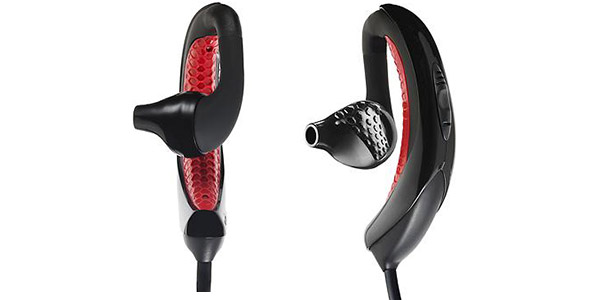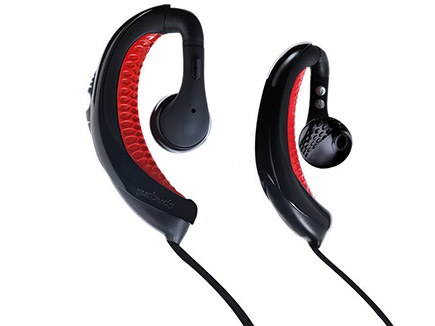Tom's Guide Verdict
The Yurbuds Focus Limited Edition Wireless Bluetooth earbuds claim to offer big sound and pro-athlete-grade durability, but the audio isn't focused enough.
Pros
- +
Secure fit
- +
Water resistant
- +
Audible battery indicator when juice runs low
Cons
- -
Sound lacks clarity
- -
Not very comfortable
- -
Finicky pairing process
- -
Controls are difficult to operate while wearing the earbuds
Why you can trust Tom's Guide
Designed for folks who want wireless sound while working out or playing sports, Yurbuds' Focus Bluetooth earbuds provide "the biggest sound available," the company claims. Unlike the similarly priced Yurbuds Inspire, which have oversize earbuds, the $130 Focus earbuds house their electronics behind your ear. Unfortunately, the Focus didn't keep us very pumped up during our workouts.
Design

The electronics in the Focus Wireless are housed in glossy black ear hooks that fit over the tops of and behind your ears, while the earbuds protrude into your ear canals via silicone eartips. The eartips don't create a seal, so they don't block out any noise, but the company advertises this as a safety feature, which keeps you from getting run over while jogging.
A textured, silicone strip lines the undersides of the earhooks, so they don't slide around as you sweat. They're also IPX 5 certified for water resistance, so you won't kill these buds if you sweat a lot or jog in the rain.
MORE: The Best Headphones Available Now
A flat, 14-inch cable connects the earbuds, and a rubber flap near the cable connector on the left earbud hides the microUSB charging jack. The left earbud also sports power and Bluetooth discovery-mode buttons, and the right earbud has volume controls and a call send/end button. Both earbuds have built-in mics for taking phone calls.
The package includes a microUSB charging cable, extra eartips and a ballistic nylon zippered pouch.
Comfort and Operation
We found the Focus Wireless slightly more comfortable than the Inspire Wireless, thanks to the earhooks taking some of the weight off our ear canals. Ultimately, however, the eartips just didn't feel very good.
Get instant access to breaking news, the hottest reviews, great deals and helpful tips.
We love in-ear headphones, but these are so much less comfortable than other pairs we've tested, wireless or not, that we have a hard time recommending them based on that alone. The Focus Wireless did stay on no matter how hard we shook our head or jerked side to side, but the cable around the back of our neck would occasionally catch and pull on the earphones if we turned our head too far to one side.
It took several attempts to pair the headphones with our iPhone 4S and iPad with Retina display (4th generation), which was surprising given that we didn't have the same problem with the Inspire Wireless. The tiny power and Bluetooth buttons are not accessible while you're wearing the earphones, nor are they easy to press even when you're holding them in your hand.
Pressing the volume up-down buttons or the call send/end button (which does double-duty as a track skip button and activates Siri when you hold it down) resulted in discomfort from the pressure against our ears. We also found the call/track skip button to be inconsistent; we often wound up not getting the desired result when we pressed it multiple times.
We would rather have seen an inline controller on the cable with this ear hook design. Or at least better button location would help, so you could just squeeze the earphone itself instead of squeezing the headphone against your ear.
MORE: Our Favorite Soundbar Speakers
Audio Performance
The Focus Wireless' overall sound is best described as muddy with a modicum of bass. Acoustic jazz such as John Coltrane’s "Blue Train" suffered from a lack of kick drum presence, though the upright bass sounded decent. Cymbals didn't have any crispness and sounded like mush, and the midrange detail in the piano was subpar.
On Jay-Z's "Holy Grail," we could hear the deep bass that enters at about 1:18, but Justin Timberlake's vocals were harsh and unpleasant. The Focus mangled rock tracks such as Metallica's "Enter Sandman," making the vocals and guitars sound nasal and thin, while the kick drum lacked the deep thump it's supposed to have. The vocals on Pink Floyd's "Comfortably Numb" fared better, though the overall muddiness still detracted from the experience.
Phone Calls
On both ends, phone calls lacked clarity on the Yurbuds Focus, though both the caller and receiver could understand most of what was said. The mics didn't pick up too much street noise from the caller on the other end of our testing, though the lack of a seal in our ear canal meant that loud noises around us easily distracted us during the call.
Battery Life
The Yurbuds Focus earbuds are rated for about 6 hours of playback per charge, which is right in the middle of the pack among wireless earbuds. Our testing confirmed that claim, though your mileage will vary depending on listening volume and how much you use the onboard controls and the phone call features. The battery indicator on our iOS devices showed the Focus' charge level, but we like that a voice prompt gives you an audible warning when there's roughly 30 minutes of charge left.
Verdict
The Yurbuds Focus Wireless earbuds stay on very securely and will survive even the sweatiest workouts. But they're just not comfortable, and the sound isn't so hot even if you're just trying to drown out your gym's dancehall hits while you pump iron. We'd much rather recommend competitors such as the BlueAnt Pump HD, which is more comfortable and has better bass, or the Plantronics BackBeat Fit, which offers clearer sound and better comfort. Note that both of those are priced similarly to the Focus Wireless, and both are designed to block out external noise.
Follow Mike Korbin on Google+. Follow us @tomsguide, on Facebook and on Google+.
Mike Kobrin is a freelance journalist who has written about audio technology for the likes of Popular Science, Popular Mechanics, Mens Journal, Rolling Stone, Consumers Digest, DigitalTrends, Wired News, CrunchGear, CNet and PC Magazine, as well as Tom's Guide. He's also a musician, with years of experience playing the trumpet.






